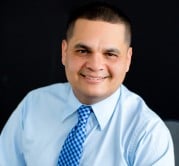Seeing the true impacts of COVID-19: How credit unions can support marginalized communities

Nearly nine months into what has been one of the most challenging years in our lifetimes, COVID-19 continues to ravage the health, finances and spirits of many. In addition to disrupting everyday life, the novel coronavirus has brought to light long-standing societal and structural problems that especially predispose marginalized communities to dire consequences. One does not need to go far to see the alarming impact that the coronavirus has had on minoritized communities. The American Medical Association (AMA) has published a series of articles on health equity highlighting how some communities will suffer more acutely during the crisis. In terms of personal finance, Pew Research Center finds that economic fallout is hitting people of color the hardest. Mental health is profoundly impacted, especially with a situation that has no immediate end in sight.
Why are people of color being impacted in greater numbers?
Black and brown Americans are disproportionately represented in the service sector, where they are among the lowest paid, most likely to be laid off, least likely to be able to engage in work from home, and most likely to be exposed to the virus. New evidence also suggests that Black Americans face higher rates of coronavirus infection and mortality. Similarly, many Hispanics have been deemed essential workers who need to treat the ill, grow produce and stock shelves.
As noted in a Filene blog post earlier this year, one of the initial ways people talked about the coronavirus was that it “did not discriminate”, that it was an “equalizer” or an “equal-opportunity” threat. We now know that this could not have been further from the truth. Instead, the pandemic has disrobed the ugliness of inequality in the United States. COVID-19 is shining a light on what it means to have less income, less savings, fewer benefits like paid sick leave, and less access to insurance and healthcare.
Within the credit union community, we see a positive outcome: a renewed attention and support for storied system organizations that for decades have helped with the financial inclusion of marginalized populations in the United States. Even before it was called “DEI”, the African American Credit Union Coalition, Inclusiv, the Juntos Avanzamos Program, National Association of Latino Credit Unions & Professionals and Coopera had been helping the system understand what it means to “do good by doing well”. And we see the industry crafting new initiatives to support the vast jurisdiction of DEI. Recently Filene created the Center of Excellence for DEI, and Superbia and CU Pride have joined the inclusion effort to bring light to LGBTQ+ community needs. Additionally, a group of credit union partners have organized to create the CU DEI Collective, a collaboration to advance the understanding and adoption of diversity, equity and inclusion initiatives. I am proud to chair this new initiative.
This list is by no means all-encompassing, rather, it highlights the growing concern, interest and support for DEI. There is an industry pledge that calls attention and encourages action so that we as a movement commit to change. Has your organization committed to change? This pledge outlines a number of actions to be taken by credit unions on their path toward fulfilling their mission to relentlessly include.
What other actions can be taken at the state and local levels if you are a member, a leader or a staff member of a credit union?
At the state level, community-based organizations are natural partners for credit unions. Together, they are deploying educational resources to help with understanding the societal and systemic structures that keep certain populations marginalized. Case in point, the 21-day Challenge from the United Way. Over the 21-day Challenge, you will take a self-guided learning journey that examines the history and impacts of racism and how it shapes people’s lived experiences. Many United Way state chapters are encouraging participation in the challenges.
At the local level, we see credit unions responding to unique homegrown challenges, depending on the intensity and particular characteristics of the pandemic in their neck of the woods. The cycle that we see spans from crisis management, emergency relief, to staff health, and keeping operations up and running to support members through varying degrees of financial stress.
As the COVID-19 challenges continue, credit unions should stay focused on connecting and using their mission of inclusion to help ALL, but place a special interest and focus on marginalized and underserved segments of society so they start feeling a sense of belonging. Deliberate action and clarity will guide our movement to achieve it. The “people helping people” stated mission of credit unions has once more become a call to action and motivator to do good. This mission can certainly help in aiding relief amid the wretched 2020 pandemic. Let’s be a force for good.





